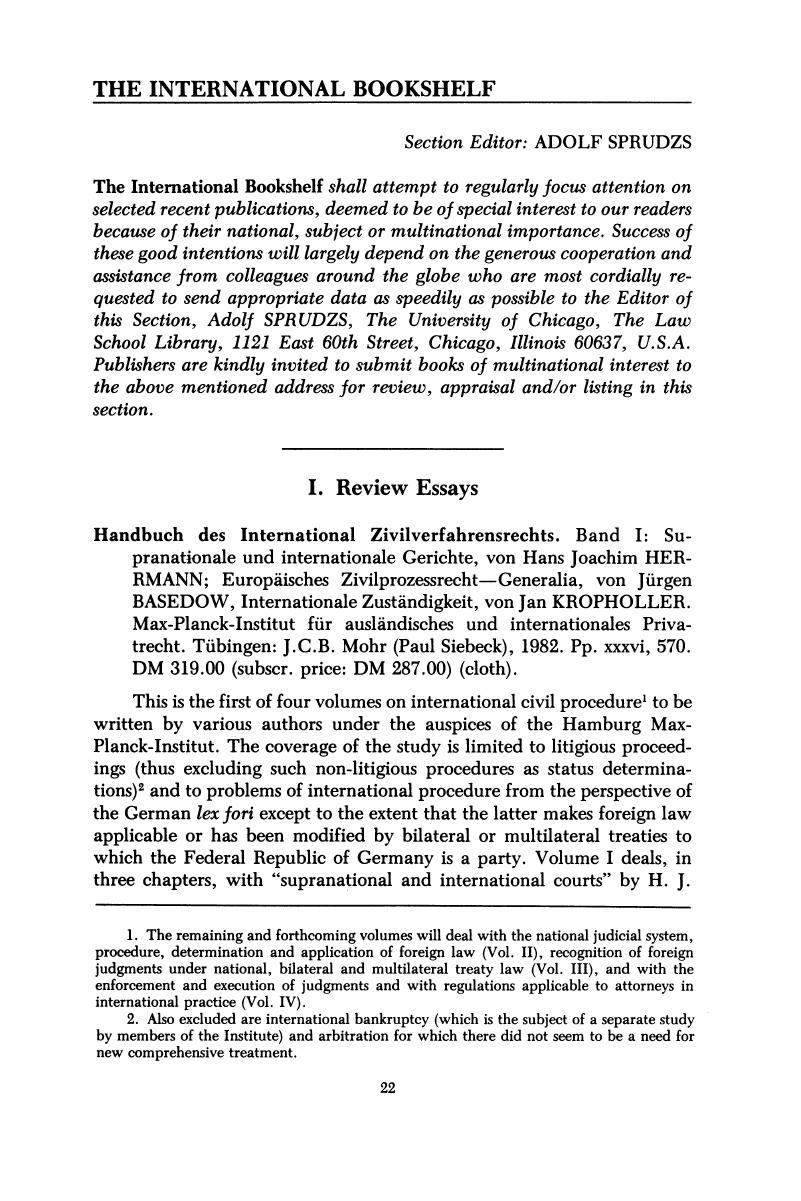No CrossRef data available.
Article contents
Handbuch des International Zivilverfahrensrechts. Band I: Supranationale und internationale Gerichte, von Hans Joachim Herrmann; Europäisches Zivilprozessrecht—Generalia, von Jürgen Basedow, Internationale Zuständigkeit, von Jan Kropholler. Max-Planck-Institut für ausländisches und internationales Privatrecht. Tübingen: J.C.B. Mohr (Paul Siebeck), 1982. Pp. xxxvi, 570. DM 319.00 (subscr. price: DM 287.00) (cloth).
Published online by Cambridge University Press: 28 February 2019
Abstract

- Type
- The International Bookshelf
- Information
- Copyright
- Copyright © 1984 by International Association of Law Libraries
References
1. The remaining and forthcoming volumes will deal with the national judicial system, procedure, determination and application of foreign law (Vol. II), recognition of foreign judgments under national, bilateral and multilateral treaty law (Vol. III), and with the enforcement and execution of judgments and with regulations applicable to attorneys in international practice (Vol. IV).Google Scholar
2. Also excluded are international bankruptcy (which is the subject of a separate study by members of the Institute) and arbitration for which there did not seem to be a need for new comprehensive treatment.Google Scholar
3. This chapter is largely descriptive and seeks to provide (at times hard-to-find) factual information on the Court of Justice of the European Communities, the European Court of Human Rights, the International Court of Justice, the international Commissions for the Rhine and for the Moselle Rivers, the international courts for restitution of property and for damage claims resulting from injustices wrought by the Nazi-regime, the Mixed Commission for the interpretation of appendix IV of the 1953 London Convention on German Foreign Debt, the European Atomic Energy Court, the Court of the West European Union (not yet established), the planned Law of the Sea Tribunal, and the International Center for the Settlement of Investment Disputes. Of these, the EC Court of Justice naturally receives the most extensive treatment. A brief section (pp. 62–67) suggests reforms in its procedures.Google Scholar
4. However, the treatment of the European Convention by both Basedow and Kropholler occasionally results in a lack of coordination. Thus, Art. 5(1) (jurisdiction at the place of performance) and the problem of independent vs. national-law-oriented interpretation are discussed both at pp. 124 and 454-56. While the table of treaty citations lists these and other passages relevant to Art. 5 (however without subdividing that provision into its five numbered subsections), the two passages cited, occurring in different chapters, are not crossferenced to each other. As a result and illustratively, the two treatments of the problem are not entirely consistent in their assessment—supportive or critical—of the European Court's decision in Case 56/79 [1980], E.C.R. 89, that an express agreement on the place of performance can have the same effect as a forum selection clause even if it does not comply with the formal requirements applicable to the latter under Art. 17.Google Scholar
5. For instance, the discussion of forum selection clauses relies, in its reference to the United States, on older literature (at 394-95 nn. 1120, 1124) and overlooks that the Supreme Court's decision in Bremen v. Zapata Off-Shore Co., 407 U.S. 1 (1972), resulted in more general acceptance of forum selection clauses only because subsequent federal decisions construed it as binding on federal courts in diversity cases (in which state substantive law otherwise applies). See Hoes of America, Inc. v. Hoes, 493 F. Supp. 1205 (CD. Ill. 1979), aff'd, 7th Cir. (unreported). The most extensive recent discussion of this area is by Gruson, Forum-Selection Clauses in International and Interstate Commercial Agreements, 1982 U. Ill. L. Rev. 133-205.Google Scholar




